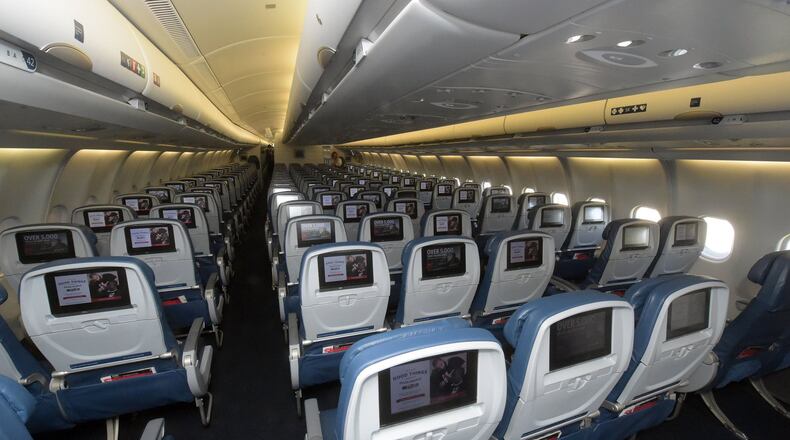LAS VEGAS — Delta Air Lines plans to make sitting in an airplane seat a bit more like sitting in your living room, with free in-flight Wi-Fi and entertainment recommendations based on your viewing habits, the carrier announced Thursday at an international tech convention.
The Atlanta-based airline says as of Feb. 1 it will offer free Internet connectivity on about 80% of its domestic flight system, after months of testing the technology. It plans to add free Wi-Fi on international flights and regional jets as well to equip its entire fleet by the end of 2024.
“I’ve long held the vision that Wi-Fi should be free for all,” said Delta CEO Ed Bastian on stage at the influential Consumer Electronics Show in Las Vegas.
Credit: Kelly Yamanouchi
Credit: Kelly Yamanouchi
The announcements, years in the making, amount to some of the biggest changes to in-flight entertainment Delta has made since launching Internet service across its fleet. In-flight entertainment and connectivity are key selling points for not only leisure travelers for business travelers who need to stay connected in the air and get tasks done on work trips, and corporate travel is a lucrative source of revenue for Delta.
Delta plans to use the new amenities as a carrot to persuade more people to sign up for its SkyMiles loyalty program. The free Wi-Fi and customized in-flight entertainment will be available only to SkyMiles members — or to anyone who signs up on the spot for the frequent flier program.
With the official launch of free Wi-Fi on Feb. 1, those who are not SkyMiles members and choose not to sign up for the frequent flier program would have to pay $10 per flight for Wi-Fi. That’s twice as much as the current price of $5 per flight.
Later this year, Delta plans to roll out a new in-flight entertainment platform that can offer customized recommendations of what to watch and notifications for connecting flights on seat-back screens, and streaming from Paramount+ and other new entertainment options on personal devices. Those seated in first class will be able to order food and beverages on their seatback screens instead of waiting for a flight attendant to come down the aisle.
It’s part of a broader shift among travelers who want to be able to search the Internet, scroll through social media or reply to e-mails and texts on their personal devices while watching a movie or television series on a seatback screen — similar to how they sit on the couch at home in front of the TV while looking at their phones.
Bastian served as a keynote speaker at the massive CES technology convention that’s expected to draw about 100,000 attendees through Sunday. Tech industry conventioneers filled multiple venues around the Las Vegas strip Thursday as the event launched. Delta has a “Wonder Window” on display handing out branded tchotchkes to customers who link their Delta and Starbucks loyalty accounts.
Bastian emphasized that connectivity is important everywhere, and the company’s vision is to “deliver an experience at 30,000 feet that feels close to what our customers have available on the ground.” The airline has invested $1.5 billion into making that happen, including installing Wi-Fi antennas and equipment, along with seatback screens on its aircraft.
“We want to make travel more personal,” Bastian said. That involves allowing travelers to use their personal devices for more activities during flights, and turning seat-back screens into “smart screens” with a customized experience.
The airline hopes to sign up more young travelers as SkyMiles members, with Delta’s senior vice president Dwight James noting in an interview that nearly 70% of all new members are millennials or younger. Delta has more than 25 million active frequent flier members, out of a total of more than 100 million signed up in the program, he said.
“Whether you’re sitting in the first row or the last row on the plane, we’re going to have a personal relationship with you when you’re in the sky,” James said.
Bastian told The Atlanta Journal-Constitution in 2018 that he wanted to offer free Wi-Fi in two or three years, but the pandemic financially strained the airline and slowed progress.
Airlines have struggled for years with spotty, unreliable inflight Wi-Fi using older technology that doesn’t have the bandwidth to support streaming and high demand.
Making Wi-Fi free hinges on upgrading the technology on planes to satellite-based Internet connectivity. It is a time-consuming effort that requires installing the equipment on each plane when it comes in for scheduled maintenance. That’s a key reason why every Delta plane does not yet have free high-speed Wi-Fi.
Delta is not the first airline to offer free Wi-Fi. New York-based JetBlue Airways has for years offered free high-speed Wi-Fi to its passengers, as do some foreign carriers. It is also sometimes offered through sponsorships or specific providers, such as free in-flight Wi-Fi for T-Mobile customers on some flights on Delta, United, American and Alaska Airlines.
The new high-speed Wi-Fi on Viasat-equipped aircraft on Delta is sponsored by T-Mobile, but will be available to all Delta SkyMiles members, not just T-Mobile customers. And Delta said it is committed to continuing the free Wi-Fi, even after the T-Mobile sponsorship ends.
Delta’s in-flight experience rollout
The airline plans to add these in-flight amenities for SkyMiles frequent flier members in 2023:
- Free Wi-Fi on the majority of domestic flights
- Paramount+ for up to 24 hours after the start of their flight
- New York Times Games in-flight, including Wordle, crossword puzzle and Spelling Bee
- Resy dining guides by destination
- Atlas Obscura travel recommendations by destination
About the Author
The Latest
Featured



